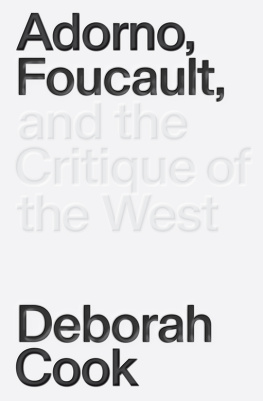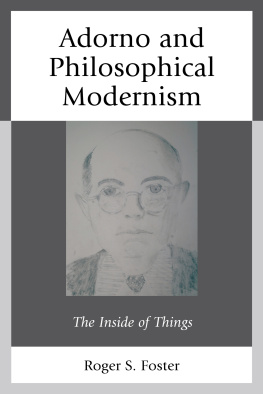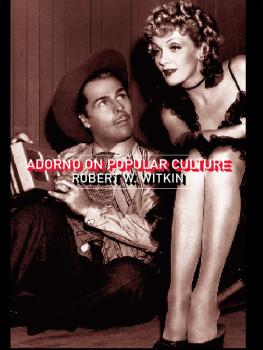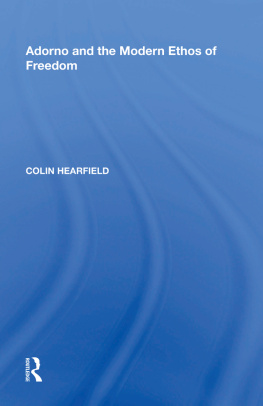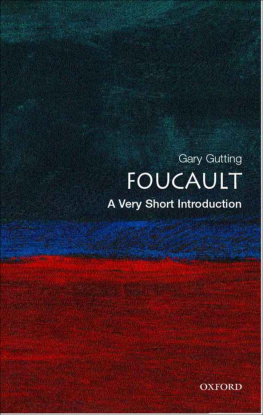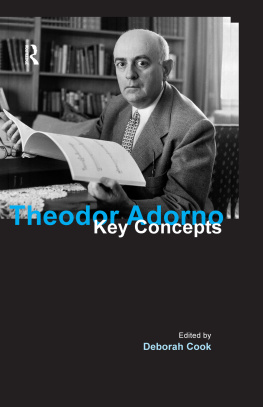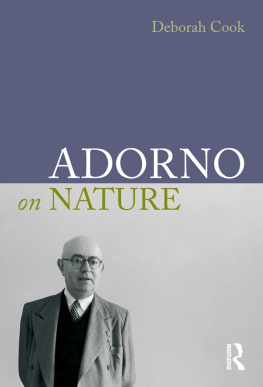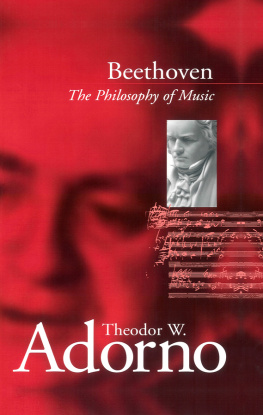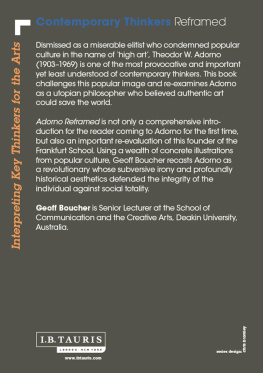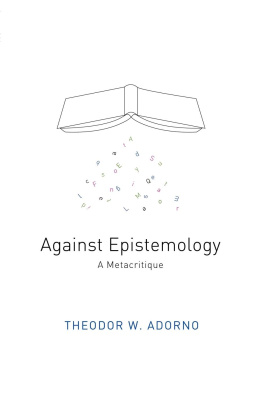Contents
This eBook is licensed to Dunno Thanks, allthingsred@mail.com on 03/25/2020
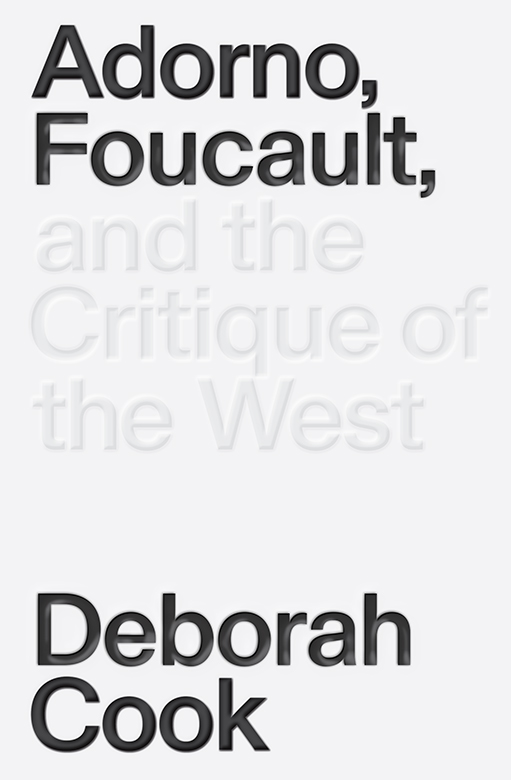
Adorno, Foucault and the Critique of the West
This eBook is licensed to Dunno Thanks, allthingsred@mail.com on 03/25/2020
Adorno, Foucault and
the Critique of the West
Deborah Cook

This eBook is licensed to Dunno Thanks, allthingsred@mail.com on 03/25/2020
First published by Verso 2018
Deborah Cook 2018
All rights reserved
The moral rights of the author have been asserted
1 3 5 7 9 10 8 6 4 2
Verso
UK: 6 Meard Street, London W1F 0EG
US: 20 Jay Street, Suite 1010, Brooklyn, NY 11201
versobooks.com
Verso is the imprint of New Left Books
ISBN-13: 978-1-78873-082-2
ISBN-13: 978-1-78873-080-8 (UK EBK)
ISBN-13: 978-1-78873-081-5 (US EBK)
British Library Cataloguing in Publication Data
A catalogue record for this book is available from the British Library
Library of Congress Cataloging-in-Publication Data
A catalog record for this book is available from the Library of Congress
Typeset in Minion Pro by Hewer Text UK Ltd, Edinburgh
Printed in CPI Mackays, UK
This eBook is licensed to Dunno Thanks, allthingsred@mail.com on 03/25/2020
Contents
This eBook is licensed to Dunno Thanks, allthingsred@mail.com on 03/25/2020
Three chapters in this book are based on pilot essays that were subsequently expanded and extensively revised. An early version of is based loosely on Adorno, Foucault and Critique, an article published in Philosophy and Social Criticism 39, no. 10 (2013), pp. 96379. I am grateful to the anonymous reviewers of these essays for their astute commentary. I should also like to thank the anonymous reviewer at Verso whose criticisms improved this book by enabling me to reframe it.
The Social Sciences and Humanities Research Council of Canada (SSHRC) provided me with research funding which enabled me to consult the Foucault Archives at the Institut Mmoires de lEdition contemporaine (IMEC). My research at IMEC brought me into contact with scholars from all over the world with whom I enjoyed sharing ideas over meals at the Abbaye Ardenne. The SSHRC grant also allowed me to hire one of my graduate students to search for journal articles. Staicha Kidd doggedly pursued quarry that was often difficult to find, and she did so with a smile and an infectious sense of humour. Thank you, Staicha.
Thanks too to James Swindal at Duquesne University; his early encouragement meant a great deal to me. Another debt of gratitude is owed to Stefano Giacchetti Ludovisi who has organized the annual Critical Theory conference at the Rome campus of Loyola University of Chicago since its inception a decade ago. Equally deserving of mention are Stefanos colleagues at Loyola David Ingram and Hugh Miller along with other participants at the conference, especially Andrew Feenberg and Anne-Marie Feenberg-Dibon. For several years, Stefano, David, Hugh, Andrew and Anne-Marie helped me to improve my work by criticizing it. I have also been buoyed by many students at the Rome conference; their comments were always stimulating.
Parts of this book were presented at two other venues. In 2014, I presented a section of . In both Vancouver and Toronto, I learned much from the thoughtful questions of those who attended.
Finally, thanks to my friend, musician Terence Kroetsch, for raising my sometimes flagging spirits with music and laughter. And thanks also to the painter John (Jack) Brown for his support during the years of love and loss in which this book was written.
This eBook is licensed to Dunno Thanks, allthingsred@mail.com on 03/25/2020
This book will argue that critical theory continues to offer important resources for critique and contestation during this turbulent period in our history. To assess these resources, I shall examine the work of two of the twentieth centurys more prominent social theorists: Theodor W. Adorno and Michel Foucault. Although Adorno was situated squarely in the Marxist tradition that Foucault would occasionally challenge, I hope to demonstrate that their critiques of our current predicament are complementary in important respects. Among other things, these critiques converge in their focus on the historical forces economic in Adorno and political in Foucault that gave rise to racist and authoritarian tendencies in the West. They also offer remarkably similar answers to the perennial question: What is to be done?
With the wealth of primary material (including lectures, essays, interviews and translations) published over the last two decades, it was possible to approach Adornos and Foucaults critical theories jointly and critically with a view to evaluating their work. Yet it was important to proceed with caution. As Friedrich Nietzsche once observed: He who seeks to mediate between two bold thinkers stamps himself as mediocre: he has not the eyes to see uniqueness; to perceive resemblances everywhere, making everything alike, is a sign of weak eyesight. that I had edited for a keynote address in Rome, effectively asked me though not quite so bluntly if I was planning to reduce Foucault to Adorno.
That I try to avoid conflating their ideas will, I hope, become apparent in the course of reading this book. For example, will show that Foucault does not share Adornos aim of returning to things themselves.
Of course, it would be equally problematic to focus only on the differences between Adorno and Foucault. That their ideas are often complementary is hardly surprising. Equally important, they were affected profoundly by the same historical events. As I shall argue here, their experiences of fascism during the Second World War motivate their search for an Ausgang a way out of our current predicament. In fact, the similarities between their ideas are acknowledged by Foucault himself. By the late 1970s, Foucault recognized that he belonged to the Kantian tradition of critique that spawned the Critical Theory of the Frankfurt School. In the early 1980s, he also noted the parallels between Adornos work and his own.
I remain convinced that Adornos and Foucaults critiques of the West have much to teach us about ourselves. They take us on a voyage of critical self-discovery, attempting to make us more self-aware so that we no longer find ourselves in the situation of Nietzsches seekers after knowledge who were unknown to themselves because they had never tried to find themselves. At the same time, and to cite Ren Chars Partage formel a paean to those who resisted the Nazis that effectively serves as a leitmotif in Foucaults work Adorno and Foucault invite us to develop our legitimate strangeness by acquiring a better understanding of the forces that have shaped our identities and resisting them. Indeed, given their concerns about a resurgence of fascism, this book will also argue that Adorno and Foucault have strong normative commitments to autonomy. If I succeed in conveying to readers at least some of the resistive force that animates these social theories, then the time that it has taken me to write this book will have been well spent.
This eBook is licensed to Dunno Thanks, allthingsred@mail.com on 03/25/2020
| BB | Foucault, The Birth of Biopolitics |
| MM | Adorno, Minima Moralia |

